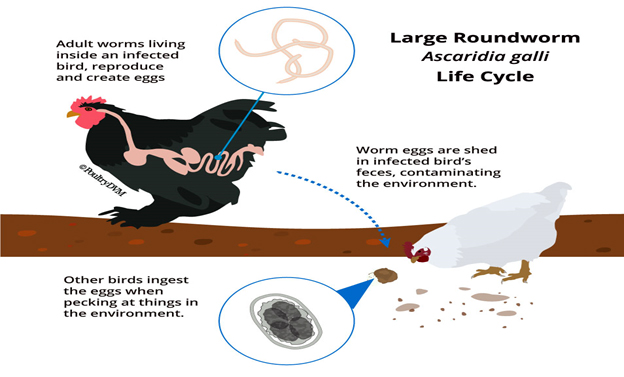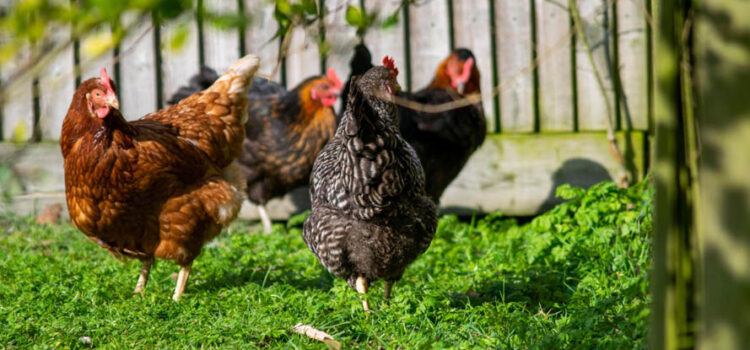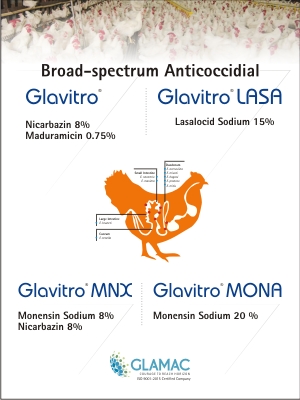A parasite is an organism that inhabits or lives on another organism (known as the host) and benefits from that other organism’s weakness. Worms and protozoa are the two types of internal parasites that afflict chickens. Low infestation levels often pose little threat and can be left untreated. Unfrugality, poor development and feed conversion, decreased egg production, and, in severe cases, mortality are clinical symptoms of a parasite infestation. Additionally, parasites can increase a flock’s susceptibility to diseases or exacerbate an existing medical state. This article primarily focuses on the effects of intestinal parasites on production, health, and control strategies to reduce the parasite burden in chicken.

Dept. of Poultry Science,
College of Veterinary Science, Korutla
PV Narsimha Rao Telangana Veterinary University
Chickens in flocks of backyard poultry are frequently infected with intestinal parasites (worms). The presence of a few parasites typically does not pose an issue. On the other hand, high populations can seriously harm growth, egg production, and general health. The quantity of parasite eggs present in the hens’ habitat is one element that significantly affects the infection’s severity. By eating snails, earthworms, or other insects (intermediate hosts) that can transmit the parasite eggs, or by consuming tainted feed, water, or litter, chickens can acquire the parasite eggs directly.
Unfrugality, inadequate development and feed conversion, decreased egg production, and, in severe cases, even mortality are clinical symptoms of parasitism. Additionally, parasites can weaken the flock’s resistance to illnesses and exacerbate already present disease conditions.
Large roundworms (Ascaridia galli) are the intestinal worms that cause the most harm. Young birds are more badly impacted. A little infection frequently goes unnoticed. However, a large number of worms hinder feed absorption, which results in subpar growth and productivity. In cases of severe infestations, the worms may actually clog the intestines, which can be fatal. Affected birds are wasteful and more prone to other illnesses. By consuming grasshoppers or earthworms that are harboring the parasite, or by directly ingesting the parasite egg in fecal-contaminated diet, water, or litter, roundworms can be transmitted from one bird to another.

The cecal worm is a different worm frequently discovered in chickens (Heterakis gallinarum). Although it rarely creates issues for chickens, its main economic significance comes from its function as a carrier of the bacteria Histomonas melegridis, which causes the lethal disease blackhead in turkeys. The histomonad organism from the chicken litter is ingested by earthworms along with the egg of the cecal worm. The turkeys become afflicted after consuming the earthworms. Turkeys may also consume the histomonad organism directly from the cecal worm egg. Therefore, it is never advisable to house hens and turkeys together or to let turkeys utilize a range that had previously been used by chickens.
Small roundworms are another type of intestinal parasite that can be problematic (Capillaria sp.) These parasites invade the intestines, causing bleeding and thickening of the intestinal walls, which impairs the body’s ability to absorb nutrients and stunts growth. By consuming parasite eggs or other vectors harboring the parasite, such as earthworms, insects, or other small roundworms, small roundworms can be transmitted directly from bird to bird. In contrast to other worms, tapeworms must be transmitted through a middle host, such as a snail, slug, earthworm, beetle, or fly.
The right management of nutrition, sanitation, and treatment are necessary to prevent and control worm infections in backyard chicken flocks. Chickens require a balanced diet, with a focus on getting enough vitamins A and B. It has been demonstrated that a lack of these increases a person’s vulnerability to parasitism.
- Complete cleanup of chicken waste between flocks.
- Try to keep litter as dry as you can.
- Avoid from crowding.
- Keep pigeons, other birds, and wild birds away from hens. They can have an infection and be shedding worm eggs.
- To prevent droppings from accumulating, give ranges adequate drainage and shift shelters often.
- Keep birds away from recently ploughed ground where they are more likely to eat earthworms and other insects.
- To reduce insect numbers, use pesticides.
By lowering parasite levels in birds that are severely affected, the treatment of chickens to reduce intestinal parasites can help the grower. As a result, there will be less parasite egg accumulation in the environment. Particular worm illnesses need for particular treatments. Prior to therapy, your veterinarian should identify the specific worms that are bothering your chickens. Intestinal worm production losses should be kept to a minimum with proper medicine administration, good management and sanitary procedures.
Author: Dr. Rambabu.D, Associate Professor
Dept. of Poultry Science, College of Veterinary Science, Korutla
PV Narsimha Rao Telangana Veterinary University
Jagtial dist – 505 326. Telangana State, India.
Email: ram_vetdoc@rediffmail.com
Title Image Credit: FreePik.com






